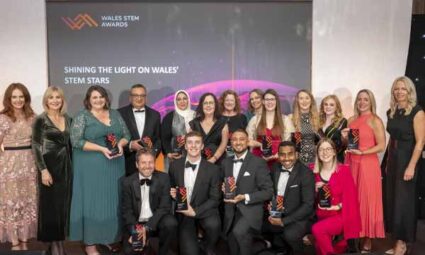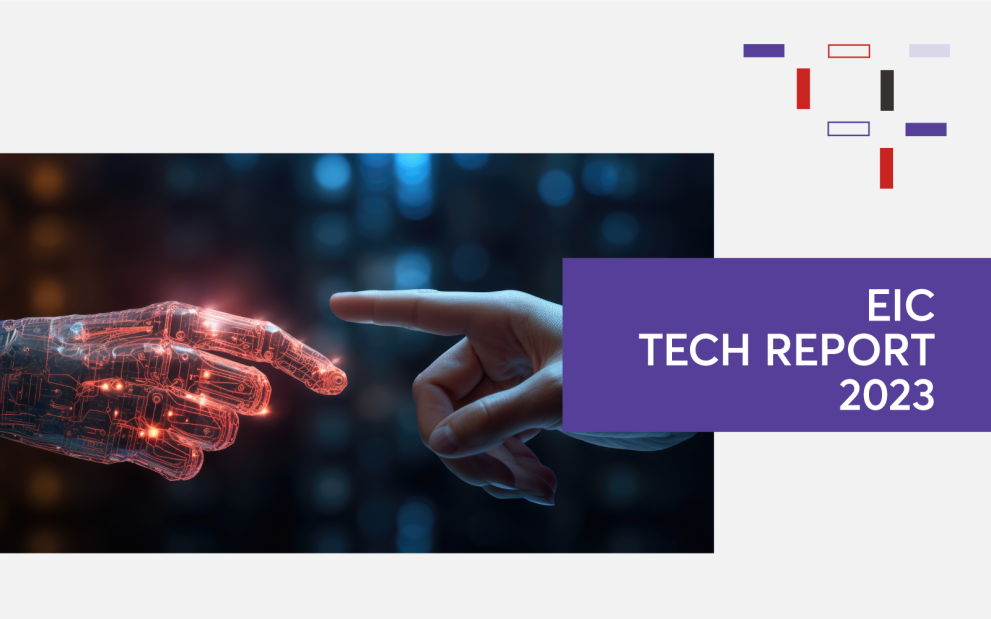Winners of the 2023 Wales STEM Awards Announced
The Wales STEM Awards 2023 were held on the 13th October and RedKnight was delighted be one of the event sponsors. The annual ceremony shines a spotlight on the organisations and individuals making a difference to the STEM (Science, Technology, Engineering, Maths) agenda in Wales.
The awards celebrate those leading the sector in Wales, those businesses creating an impact on the Welsh economy, those addressing the STEM diversity gap and skills shortage, and those inspiring and raising aspirations of the next generation.
The ceremony saw finalists from across all parts of Wales compete for 14 awards in a variety of categories, ranging from STEM Start-Up of the Year to Innovation in STEM.
Winners of the 2023 Wales STEM Awards:
Innovation in STEM Award – Afon Technology
STEM Company of the Year (over 50 employees) – Thales
STEM Company of the Year (under 50 employees) – CanSense Ltd
STEM Educational Programme of the Year (Private Sector) – M-SParc
STEM Educational Programme of the Year (Public Sector) – ExperiMENTAL Science
STEM Educational Programme of the Year (Not-For-Profit Sector) – Techniquest
STEM Ambassador of the Year – Sian Richardson, Ipsen Biopharm Ltd
STEM Woman of the Year – Michelle Slee, DVLA and Dr Mabrouka Abuhmida, University of South Wales
STEM Rising Star of the Year – Morgan Phillips, CNECT Wales
STEM Team of the Year – Engineering Education Scheme Wales Ltd
STEM Sustainability Award – Genesis Biosciences
STEM Research Project of the Year – University of South Wales
STEM Start-up of the Year – Lunia 3D
Highly commended in the 2023 Wales STEM Awards:
STEM Company of the Year (under 50 employees): Techniquest
STEM Educational Programme of the Year (Private Sector): Admiral Insurance UK
STEM Ambassador of the Year: Richard Hebblewhite, Games Talent Wales
STEM Start Up of the Year: Thompson STEM Engagement
STEM Rising Star of the Year: James Vincent, Catsci Ltd
The European Innovation Council's (EIC) Tech Report 2023
At the forefront of scientific and technological advancements, the European Innovation Council (EIC) is a beacon of innovation in Europe. The EIC's commitment to pushing the boundaries of innovation is aptly demonstrated by the release of the EIC Tech Report 2023. This annual report shines a spotlight on the novel technologies and innovations that have been submitted to the EIC under Horizon Europe, a flagship EU research and innovation program.
What makes the EIC Tech Report 2023 stand out is its emphasis on early-stage research projects. These projects are funded following an exhaustive, independent expert review, ensuring that only the most promising and groundbreaking ideas get the support they need to thrive. The report not only celebrates the successful projects but also sheds light on areas of technology that have garnered high-quality proposals but are yet to receive funding from the EIC.
The report's scope is extensive, encompassing a wide array of technology domains. From digital technologies to industry and space, cleantech, and health, it covers a diverse range of topics, reflecting the breadth and depth of innovation in Europe.
One of the most intriguing aspects of the EIC Tech Report 2023 is its role in shaping the future of the EIC portfolio. The analysis and insights shared in the report are invaluable in guiding future explorations. By mapping internal EIC data to global trends based on patents, publications, funding, and investments, the report provides a roadmap for the EIC's future initiatives.
In essence, the EIC Tech Report 2023 is a testament to the EIC's unwavering commitment to fostering innovation in Europe. It not only showcases the remarkable projects that have received support but also serves as a compass for the EIC's journey ahead. With its dedication to nurturing early-stage research and exploring emerging technology domains, the EIC continues to be a driving force in the ever-evolving landscape of innovation.
As we eagerly anticipate the next wave of groundbreaking innovations, the EIC Tech Report 2023 serves as a reminder of the remarkable potential that lies within the European innovation ecosystem. It's a call to all innovators, researchers, and entrepreneurs to continue pushing the boundaries of what's possible and to contribute to the growing legacy of innovation in Europe. With the EIC at the helm, the future looks promising for those seeking to make a difference in the world of science and technology.
You can read the full report here.
Innovate UK Launchpads: Unlocking Innovation and Growth Across the UK
Innovate UK, in partnership with local leaders, is set to revolutionize the business landscape in the United Kingdom. Eight new Launchpads are opening for applications, each catering to specific geographic clusters and offering a plethora of support, networking opportunities, and funding to businesses of all sizes. These Launchpads are part of a broader effort to fuel innovation, foster growth, and scale businesses, all while addressing key challenges that Small and Medium-sized Enterprises (SMEs) face in their respective clusters.
What are Innovate UK Launchpads?
Net Zero Industry Launchpad (South West Wales)
The Net Zero Industry Launchpad, located in South West Wales, is a haven for sustainable solutions in the field of net-zero industrial emissions. As the world strives for a greener future, this Launchpad offers businesses a platform to innovate and pioneer technologies that reduce carbon footprints and promote eco-friendly industrial practices.
Digital Technologies Launchpad (North East England)
Situated in North East England, the Digital Technologies Launchpad is poised to lead the charge in the application of digital technologies across fast-growing and emerging markets. Businesses in this cluster can expect to find support, funding, and guidance to stay at the forefront of the digital revolution.
Health Technologies Launchpad (West Yorkshire)
In West Yorkshire, the Health Technologies Launchpad is dedicated to pioneering breakthroughs in health technologies, ultimately improving healthcare outcomes. This Launchpad is a vital resource for companies looking to make a difference in the healthcare sector.
Agri-tech and Food Tech Launchpad (Eastern England)
Nestled in Eastern England, the Agri-tech and Food Tech Launchpad is set to revolutionise the way we produce and sustain our food. By driving innovation in food production and sustainability, it aims to transform the agricultural and food sectors.
Marine and Maritime Launchpad (Great South West)
The Great South West region hosts the Marine and Maritime Launchpad, which supports initiatives in marine and maritime industries. By fostering growth and sustainability in this sector, it creates opportunities for businesses to thrive in this unique environment.
Bio-based Manufacturing Launchpad (Scotland)
In Scotland, the Bio-based Manufacturing Launchpad is committed to driving innovation in sustainable production methods. This Launchpad is for businesses seeking to make a significant impact on the environment and promote more eco-friendly manufacturing practices.
Immersive and Creative Industries Launchpad (Coventry and Warwickshire)
The Immersive and Creative Industries Launchpad, centred in Coventry and Warwickshire in the West Midlands, champions groundbreaking technologies for the creative industries and immersive experiences.
Life and Health Sciences Launchpad (Northern Ireland)
Northern Ireland hosts the Life and Health Sciences Launchpad, which is dedicated to the advancement of healthcare solutions and medical breakthroughs. It's the ideal place for businesses aiming to make a difference in the healthcare landscape.
These Launchpads build on the success of pilot programs in 2022 for the Advanced Manufacturing cluster in Liverpool City Region and the Net Zero cluster in Tees Valley. They are unique, co-developed programs designed in close collaboration with local leadership to address the specific needs of each cluster. By being embedded in the local innovation ecosystem, these Launchpads aim to provide tailored support to businesses, enabling them to flourish.
How do these Launchpads work, and who can apply?
Each Launchpad supports businesses in their innovation projects, fostering collaboration within a supportive ecosystem. The support offered includes funding for research and development, access to innovation specialist support, and opportunities for networking and collaboration. This comprehensive approach enables businesses to develop new products or services and test and validate innovations through Research and Technology Organisations (RTOs).
Moreover, in addition to providing direct support to innovative organizations, each Launchpad aims to stimulate innovation and growth within the local economy. By supporting emerging clusters of innovative businesses and working closely with local leadership, Innovate UK's goal is to create world-leading and globally connected innovation clusters across the UK.
To be eligible for an Innovate UK Launchpad competition, organizations must be based in the UK and demonstrate strong potential for growth and innovation. They must also be active or growing their work activities within the Launchpad's cluster and have the potential to support economic growth in the local area.
Competition dates vary depending on the Launchpad:
• Agri-tech and Food Tech in Eastern England: Open from the week commencing 23 October 2023 and closing on 6 December 2023.
• Marine and Maritime in the Great South West: Open from the week commencing 23 October 2023 and closing on 6 December 2023.
• Immersive & Creative, centred on Coventry & Warwickshire: Open from the week commencing 23 October 2023 and closing on 6 December 2023.
• Bio-based Manufacturing in Scotland: Open from the week commencing 30 October 2023 and closing on 13 December 2023.
• Net Zero Industry in South West Wales: Open from the week commencing 30 October 2023 and closing on 13 December 2023.
• Life and Health Sciences in Northern Ireland: Open from the week commencing 30 October 2023 and closing on 13 December 2023.
• Health Technology in West Yorkshire: Open from the week commencing 30 October 2023 and closing on 13 December 2023.
• Digital Technologies in North East England: Open from the week commencing 30 October 2023 and closing on 13 December 2023.
Visit Innovate UK's funding pages to learn more and start your application today.
How to find funding for your research and innovation project
Introduction
Undertaking a research and innovation project is an exciting journey that can lead to ground breaking discoveries and advancements in various fields. However, securing the right funding for your project is a critical factor in ensuring its success. European funding sources offer a wealth of opportunities for researchers and innovators. In this comprehensive guide, we will explore the steps and strategies to help you identify relevant European funding for your research and innovation project.
Define Your Project Goals and Objectives
Before delving into the world of European funding, it is essential to have a clear understanding of your project's goals and objectives. What problem does your research aim to address? What innovative ideas or technologies will you be developing? Defining the scope and objectives of your project will not only help you target the right funding sources but also enable you to communicate the project's value proposition effectively to potential European funders.
Tip: Many programmes fund projects based on the technology readiness level (TRL) of the innovation. If you are not familiar with the TRL scale, read more to better understand what each level means and map your product, process or service onto it. This will help you refine the competitions you should be looking at.
Identify Your Funding Needs
Once you have a well-defined project plan, it's time to determine your funding needs. Estimate the total budget required for your research and innovation project, considering all expenses, including personnel salaries, equipment, materials, travel costs, and other operational expenses. Understanding your funding requirements will help you identify European funding opportunities that align with your project's financial needs.
Explore European Union (EU) Funding Programs
The European Union offers an array of funding programs to support research and innovation projects. These programs are designed to promote collaboration across Europe and address a wide range of societal challenges. Some of the most prominent EU funding programs include:
• Horizon Europe: Horizon Europe is the EU's flagship research and innovation program. It offers various funding instruments, including grants, prizes, and loans, to support projects in areas such as health, climate, digitalization, and innovation.
• Cohesion Policy Funds: These funds aim to reduce economic and social disparities across EU regions. Depending on your project's location, you may be eligible for funds like the European Regional Development Fund (ERDF) or the European Social Fund (ESF).
• European Institute of Innovation and Technology (EIT): EIT supports innovation ecosystems across Europe by fostering collaboration between universities, research centres, and businesses. It provides funding through its Knowledge and Innovation Communities (KICs) in various thematic areas.
• European Research Council (ERC): The ERC offers competitive grants for researchers at different career stages, from Starting Grants for early-career scientists to Advanced Grants for established researchers.
Tip: To explore EU funding opportunities, visit the official EU Funding and Tenders Portal (formerly known as the Participant Portal) and search for relevant calls and programs.
Investigate National and Regional Funding Sources
In addition to EU funding, many European countries and regions offer their own research and innovation funding programs. These programs may have specific priorities and criteria, making them valuable options for researchers seeking local support. To identify national and regional funding sources, consider the following steps:
• National Research Agencies: Each European country typically has a national research agency responsible for distributing research funding. Examples include the German Research Foundation (DFG) and the French National Research Agency (ANR).
• Regional Development Agencies: Regional governments often provide funding to promote innovation and economic development in their areas. Contact your local or regional development agency to inquire about available programs.
• Collaborative Projects: Some funding programs encourage cross-border collaboration between neighbouring countries. Look for initiatives like Interreg programs, which support transnational projects aimed at addressing common challenges.
Tip: Some regional development agencies will have pots of money to facilitate international cooperation and bid-development, so be sure to ask what financial support is available to help you apply for European funding.
Seek European Private Sector Funding
Private sector funding in Europe can come from corporations, foundations, venture capitalists (VCs), and angel investors. European companies may be interested in supporting innovative projects that align with their business goals or corporate social responsibility initiatives. To find European private sector funders:
• Networking Events: Attend industry-specific conferences, innovation expos, and networking events in Europe to connect with potential private sector investors and partners.
• Venture Capitalist (VC) Firms: European VC firms actively seek opportunities to invest in innovative start-ups and early-stage companies. Research firms that specialise in your industry or technology sector.
• Corporate Partnerships: Large European corporations often engage in research collaborations with academic institutions and start-ups. Explore partnerships that offer both funding and access to resources.
Leverage Academic and Institutional Funding
European universities, research institutions, and academic organisations can offer a range of funding opportunities for researchers and innovators. These opportunities can vary by institution and may include:
• Internal Grants: Many European universities and research centres allocate funds to support faculty-led research projects. These grants can cover various aspects of research, from initial concept development to project completion.
• Student Scholarships and Fellowships: If you are a student or supervising students as part of your project, inquire about scholarship programs and fellowships within your institution.
• Research Centres and Institutes: Some European universities host specialized research centres or institutes with dedicated funding for specific fields of study or innovation.
• Collaborative Initiatives: Collaborate with colleagues and researchers within your institution to explore joint funding opportunities. Collaborative projects often receive greater attention from funding bodies.
Tip: Academic and institutional funding opportunities are typically smaller than the large grants offered by the larger grant programmes such as Horizon Europe, but they can be a useful way of moving your project along incrementally, and also building a track record of accessing funding if you are new to the scene.
Utilise Online Grant Databases
Online grant databases and search engines can simplify your search for European funding opportunities. While some of these databases cover global opportunities, you can filter your search to focus on European options. Useful databases include:
• CORDIS (Community Research and Development Information Service): CORDIS is the European Commission's primary source of information on EU-funded research and innovation projects. It provides details on open calls, project results, and funding programs.
• FundingBox: This platform offers a comprehensive database of European funding opportunities, with a particular focus on innovation and technology-related grants.
• EURAXESS: EURAXESS provides information on research careers and funding opportunities in Europe. It also offers job postings and mobility support for researchers.
When using these databases:
• Keyword Selection: Use specific keywords related to your project to narrow down your search and identify European funding opportunities that align with your research.
• Filter by Location: Some databases allow you to filter results by country or region, making it easier to find grants that are geographically relevant to your project.
• Set Up Alerts: Consider setting up alerts or subscribing to newsletters to receive notifications about new European funding opportunities that match your research interests.
Collaborate and Network
Collaboration and networking are essential components of the European research and innovation landscape. Consider the following networking strategies:
• European Research and Innovation Networks (for example, ERRIN, CrowdHelix): Join or engage with European research and innovation networks and communities related to your field. These networks often organize events, webinars, and workshops to facilitate collaboration.
• Horizon Europe National Contact Points (NCPs): Each European country has designated NCPs who can provide guidance on Horizon Europe and other EU funding programs. They can help you navigate the application process and connect with relevant contacts.
• European Conferences and Workshops: Attend European conferences and workshops in your research area to meet potential collaborators and funders. These events offer opportunities for networking and showcasing your project.
• Online Platforms: Utilise online platforms and social media, such as LinkedIn and ResearchGate, to connect with fellow researchers, institutions, and potential partners across Europe.
• Collaborative Proposals: Consider collaborating on proposals with researchers and organizations from different European countries. Collaborative projects often have higher success rates in securing EU funding.
Tip: Building connections with potential collaborators, partners, and funders can significantly enhance your chances of securing European funding.
Conclusion
Navigating European funding for your research and innovation project offers a myriad of opportunities to turn your ideas into reality and make a meaningful contribution to your field and society. By defining your project goals, identifying your funding needs, exploring diverse European funding sources, and networking effectively, you can enhance your prospects of securing the right funding for your project.
Remember, persistence and adaptability are essential traits in the pursuit of European research and innovation funding. With dedication and a well-crafted proposal tailored to European priorities, you can bring your innovative ideas to life and contribute to the progress of Europe's research and innovation landscape. Whether you are seeking funding from EU programs, national agencies, or private sector investors, the path to success lies in your commitment to excellence and your ability to align your project with European aspirations for a brighter future.
It’s official: UK to associate to Horizon Europe
After more than two and a half years of uncertainty and negotiations, the UK government and the European Commission (EC) have reached a landmark agreement to enable the UK's association with Horizon Europe. This momentous announcement brings a sigh of relief to UK and EU scientists who have been in limbo since 2021, uncertain about their future in collaborative research endeavours. This article explores the significance of this agreement, its implications for UK scientists and researchers, and the rocky road that led to this crucial decision.
A Milestone Agreement
The joint statement released today (7th September 2023) by the UK government and the European Commission marks a turning point in UK-EU relations, particularly in the realm of scientific cooperation. EC President Ursula von der Leyen aptly described this agreement as proof of the EU and UK's status as key strategic partners and allies. This collaboration reaffirms their commitment to being leaders in global science and research.
Under the terms of this deal, UK scientists will regain access to European Research Council (ERC) grants and will be able to coordinate academic-industrial consortia within the Framework program. This move ends the period during which UK researchers had to rely on UK equivalent grants and funding, and it paves the way for seamless integration into Horizon Europe.
Addressing Past Uncertainties
While UK academics have been able to participate in industrially-focused Pillar 2 projects of the Horizon program, the uncertainty surrounding the UK's long-term involvement caused UK participation in the program to decrease significantly. This reduction raised concerns that UK scientists might be excluded from vital European academic networks that had been cultivated over decades.
UK-based winners of ERC grants faced a difficult choice between relocating to the EU to maintain their awards or settling for UK equivalent schemes. This decision was fraught with uncertainty and implications for both individuals and the broader scientific community.
The Long and Winding Road to Association
The journey to re-associate with Horizon Europe has been characterised by twists and turns, and it has been far from straightforward. Initially, the Horizon association was agreed upon in principle at the end of 2020, as part of the Trade and Cooperation Agreement that outlined post-Brexit relations between the UK and the EU. All that was required to formalize this association was the signature of both parties.
However, 2021 saw relations sour over the Northern Ireland issue, as the UK government threatened to suspend parts of the Northern Ireland Protocol. This protocol was designed to prevent customs checks on the island of Ireland and to ensure continued peace. The EC, in response to the unresolved Northern Ireland dispute, withheld its approval for the Horizon association.
The Horizon association became intertwined with broader political disputes, remaining elusive until February of the following year when the Windsor Framework addressed the Northern Ireland issue. Despite this progress, negotiations continued to stall, with the UK seeking assurances to prevent substantial financial losses from its late entry into the program.
Details of the Agreement
While today's announcement does not explicitly detail how negotiators resolved these financial concerns, it does mention a "temporary and automatic mechanism" designed to address any significant financial underperformance by the UK. If the UK contributes 16% more than its scientists receive in grants, this mechanism would activate. The UK is set to contribute "almost €2.6 billion" annually for its participation in Horizon Europe.
Additionally, the agreement confirms that the UK will remain part of the EU's Copernicus satellite system, despite initial concerns that the UK had already missed significant calls under the program. Copernicus plays a crucial role in understanding and addressing environmental and climate change-related challenges, making the UK's continued association valuable.
Euratom and ITER: The Missing Pieces
One notable absence in the UK's renewed association with European research initiatives is Euratom, the EU's nuclear research program. As a result, the UK will not participate in ITER, a multi-billion euro collaborative project located in France aimed at building a prototype fusion reactor. The decision not to re-join Euratom was guided by the UK's assessment that its industry's long absence from Euratom and ITER programs could not be reversed.
Instead, the UK will pursue a domestic fusion energy strategy with international collaboration, including partnerships with European counterparts. This alternative program is supported by substantial funding, up to £650 million until 2027, to ensure the UK's research interests and taxpayer funding align with its priorities.
Future Steps
The association deal reached between the UK and the EU will need to be ratified by member states through the Council of the EU, adding another layer of complexity to the process. However, this agreement signals a moment of reconciliation between the UK and the EU after the divisive Brexit debates that followed the 2016 Leave vote.
Conclusion
The UK's re-association with Horizon Europe is a significant milestone for the scientific community on both sides of the Channel. It marks a renewed commitment to collaboration, innovation, and scientific excellence. While challenges remain, including the ratification process, the agreement provides a glimmer of hope for UK scientists who can once again fully participate in Horizon Europe, ensuring the country remains at the forefront of global science and research. This development underscores the enduring power of science to bridge political divides and foster international cooperation for the greater good of humanity.
A Digital Platform to Transform School Sustainability
RedKnight is delighted to announce it has supported iAM Compliant Ltd with its successful application to Innovate UK’s Innovation Loan competition, securing the Chester-based SME £592,860 of innovation funding.
iAM Compliant was established in 2016 to provide schools and businesses with a one stop shop for premises, health and safety compliance, and cut through the red tape. The company’s novel platform offers a seamless interface and cloud-hosted solution that brings all the information users need into one central place. Having pushed the innovation boundaries from the outset, the platform is used by over 500 state schools around the UK.
iAM Compliant will use the innovation loan funding to extend the platform's functionality to provide the world’s first digital tool for schools to guide them through the process of creating their own Climate Action Plan and help them become more sustainable. The platform will be supported by the development of best in class, accredited learning content.
Tom Moore, Founder & Chief Operating Officer at iAM Complaint said:
“We’re incredibly excited to continue the innovation of iAM Compliant, none more so in the space of sustainability. We know that school leaders have a lot of responsibility, and we’re keen to simplify and support that wherever possible. Having been through the Innovate UK process twice, the difference between our applications came down to RedKnight’s expertise in helping us best present our solution and satisfy the criteria of Innovate UK.”
In April 2022, the UK Government published its policy paper titled Sustainability and Climate Change: A Strategy for the Education and Children’s Services Systems. The policy supports a drive for all UK schools to be “zero carbon” by 2030 and announces long term and consistent policies and funding to enable this (in line with wider Government targets for the UK to be carbon neutral by 2050). The policy ensures there will be investment in training teachers in education for sustainable development across the curriculum, and in equipping colleges and schools to give all learners a connection to nature. The Government also commits to investing in adapting and retrofitting the school estate and the Department for Education commits to improving their building specifications, so that all new school buildings from 2022 onwards will be net zero carbon.
To support these ambitions, by 2025 every school is mandated to have a Climate Action Plan that will result in zero carbon status. Each school will have a trained staff member who acts as a Sustainability Lead and Climate Literacy Training will be offered to every school with sustainability embedded as a statutory feature of careers guidance.
The sustainability responsibility will ultimately rest with site managers (referred to as School Business Managers in schools), many of which manage their current compliance responsibilities disparately across many different spreadsheets. The biggest challenges for those managing compliance is that they are often reactive, limited by budget, resource, and time. There is also often a lack of safety mindset, not necessarily driven by the individual but by the myriad of regulations and legislation they need to interpret and understand. The additional sustainability requirements outlined above will add further weight to the challenge.
The technology and training material to be developed through this innovation loan project will provide a much needed, easy-to-use, cost-effective digital tool to support schools in complying with the new UK Government’s strategy and helping them in becoming more sustainable.
#innovation #education #sustainability #compliance #InnovateUK #iAMCompliant #RedKnight
EIC Pathfinder: nearly €170 million to support novel technologies
The European Innovation Council (EIC) has selected the next set of proposals under the 2023 EIC Pathfinder Open call. 53 new projects will receive up to €169.5m to develop cutting-edge technologies throughout a wide range of fields, including health, artificial intelligence, computing, environment, and energy.
A total of 783 applications were submitted (6.77% success rate), with the highest number of selected applicants coming from France, Spain, Germany, Italy and the United Kingdom. Participants mostly come from higher education and research organisations, with SMEs accounting for around 18% of participants.
In addition to the grant funding, selected proposals will receive bespoke coaching under the EIC Business Acceleration Services.
Examples of selected projects are:
- E-COOL - A holistic approach of electric motor cooling: E-COOL develops a holistic cooling technology for electric motors, maximising heat transfer through direct-contact spray cooling optimised with the aid of new Machine Learning (ML) algorithms. The project aims to provide unprecedented cooling rates at local temperature hot spots. The proposed cooling system will significantly contribute to reduce the excess of heat generated during power-demanding operations, making the employment of electric motors in commercial or heavy-duty vehicles possible, for example in earth-moving machines and aircrafts.
- ICONIC - In-situ and operando organic electrochemical transistors monitored by non-destructive spectroscopies for organic CMOS-like neuromorphic circuits: The ICONIC project will develop ultra-flexible, conformable and implantable artificial intelligence organic electronic devices which hold promise to revolutionize the real-time monitoring and treatment of chronic diseases. ICONIC will combine macromolecular synthesis with in-situ and operando non-destructive spectroscopic methods in an innovative way to investigate with unprecedented accuracy ion-to-electron transduction in organic electrochemical transistors (OECTs), from the molecular to the micrometre scale. In a long-term vision, healthcare devices will enable signal recognition with body-friendly electronics and administer medication without the risk of human error.
- 4TunaTES - For tunable thermochemical energy storage: 4TunaTES will unlock the potential thermal energy storage by delivering a ground-breaking flexible Thermo-Chemical Energy Storage (TCES) technology that can be easily adapted to different applications (variable in- and output temperatures) and thereby reduce the development costs by 90%. 4TunaTES will develop a TCES-prototype that can be also used for domestic use and addresses different challenges in terms of materials used, heat exchanging components with a high degree of manufacturing flexibility, and revolutionary systems with electricity adapted thermodynamic cycles.
- FASTCOMET - Future Data Storage Using Colloidal Memory Technology: Fastcomet will develop a new concept for low-cost, high-storage-density memories which are urgently needed to keep storage capabilities in line with the growing demand. It is based on a colloidal memory concept in which colloidal nanoparticles are considered data carriers. The long-term aim is to develop an integrated device that is able to store data using nanoparticles smaller than 15 nm. This would ultimately result in ultra-high bit densities exceeding 100 Gbit per square millimetre and potentially reaching 1 Tbit square millimetre at a lower cost than existing data storage technologies.
Background information
The EIC Pathfinder scheme supports the exploration of bold ideas for radically new technologies. It welcomes the high-risk/high gain and interdisciplinary cutting-edge science collaborations that underpin technological breakthroughs.
Grants of up to €3m (Pathfinder Open call – fully bottom-up) or up to €4m (Pathfinder Challenges call – with thematic priorities) support early-stage development of future technologies (e.g. various activities at low Technology Readiness Levels 1-3), up to proof of concept. EIC Pathfinder projects benefit from interactions with EIC Programme Managers and can receive additional funding for testing the innovation potential of their research outputs or for working across projects for portfolio actions. In addition, promising results can receive substantial follow up funding through the EIC Transition scheme to create a commercial venture or use the Fast Track scheme to access the EIC Accelerator to bring innovations to the market.
The EIC Pathfinder Challenges 2023 call opened on 20 June 2023 and will be closed on 18th October 2023 at 4.00pm BST/5.00pm CET.







